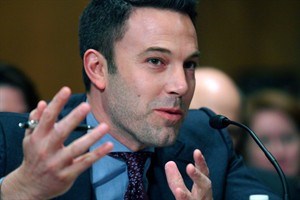
Actor Ben Affleck testifies on Capitol Hill in Washington, Thursday, March 26, 2015. Revelations that Ben Affleck requested his ancestral ties to a slave owner be omitted from a show on his family history have loomed large in the headlines. THE CANADIAN PRESS/AP-Lauren Victoria Burke
April 26, 2015 - 8:00 AM
TORONTO - Ben Affleck recently admitted he was embarrassed by his ancestral ties to a slave owner, but the Oscar winner is hardly alone when it comes to having a controversial family history.
Unearthing sordid details about relatives is not uncommon, according to genealogists. Yet in the case of Affleck and others, the sting of shame about the unsavoury characters and actions in their ancestral past can linger for decades and even centuries later.
"You might find somebody with a criminal record and things like that, but it's personal because it's family — it's your family," said professional geneaologist Ruth Blair of Blair Archival Research based in Oakville, Ont.
"There's just great sensitivity to some of these topics."
Affleck expressed regret in a Facebook post for seeking to have the information about his ancestor omitted from the episode of "Finding Your Roots" which featured the actor and aired last October.
Barry Sheldon, vice-president and lead researcher of Genealogists.com, said no one should reflect poorly upon Affleck because of his ancestral ties, adding that individuals "can't be held guilty by association."
"We all have something," Sheldon said from Berrien Springs, Mich.
"Slavery was a way of life and it was an unfortunate way of life, at least here in the United States."
In researching his own collateral line, Ontario Genealogical Society president Alan Campbell discovered a man who had enlisted to serve in the First World War but was dishonourably discharged because of frequent drunkenness.
Meanwhile, two of the discharged serviceman's grandchildren went on to serve proudly in the military.
"For them, that was a major impact, a disappointment."
Campbell said he believes that generally, family historians are seeking information that "makes people alive — and the people alive have warts."
But what may have been regarded as controversial at a specific period in their family history may not be the case as time passes, he noted.
"Let's face it: the early suffragettes, the women who were fighting for the vote and were thrown in jail at that time, they were doing things at that time supposedly illegal. But today, we would respect them for what they were doing."
Blair said a lot of genealogists like to find the black sheep in the family because typically, they're the source of the most information. She was able to discover details through newspaper reports about an ancestor on her collateral line who had been murdered — information she was unable to find in other records.
"If you've been good and you followed the rules, who's going to keep a whole lot of paper on you?" she said, laughing.
"You'll be in the newspaper for a birth, a marriage and a death."
— With files from The Associated Press.
— Follow @lauren_larose on Twitter.
News from © The Canadian Press, 2015